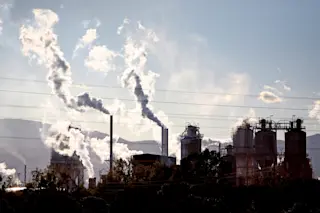Carbon dioxide is climate change’s villainous star. But methane, an even more potent greenhouse gas, is CO2’s lesser-known evil twin. Researchers now find methane levels in the atmosphere are on an escalating upward trend. That’s a problem because emission scenarios that limit global warming to 2 degrees Celsius assume methane levels will drop over the next 30 years.
To make matters worse, scientists aren’t really sure what’s causing methane to go up rather than down. If we have any hope of slowing climate change it’s a question that needs answers, says Sara Mikaloff-Fletcher, an atmospheric scientist at the National Institute of Water and Atmospheric Research in Wellington, New Zealand, in new work in the journal Science.
“We urgently need to determine why atmospheric methane continues to rise and whether it is possible for humans to slow it,” she said.
Like carbon dioxide, atmospheric methane has been rising since preindustrial times. ...














